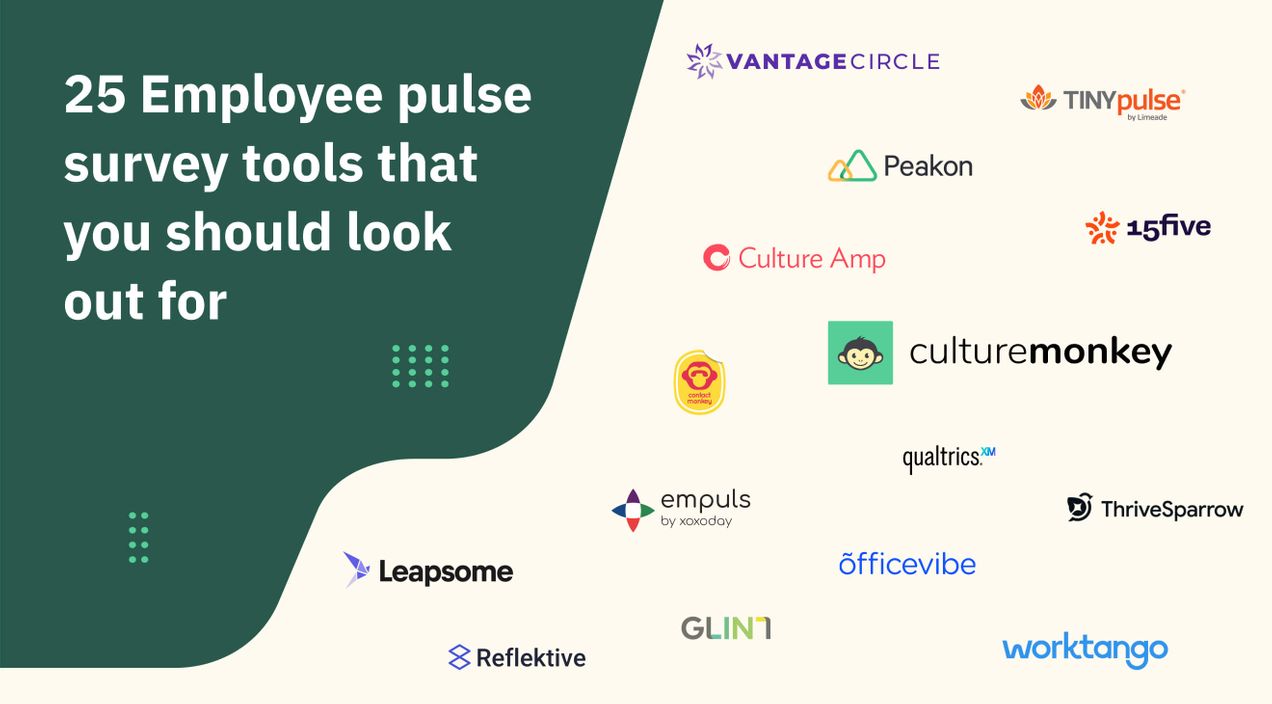CultureMonkey Blog
Employee Engagement Articles

Mastering Employee Engagement Pulse Surveys: The Ultimate Guide for HR Leaders
Employee pulse surveys are the key to building a thriving workplace. Learn how to design effective surveys, avoid survey fatigue and gather actionable insights. From crafting the right questions to ensuring participation, this guide equips HR leaders with tools to transform employee satisfaction.
Top 70+ employee net promoter score questions to measure employees' satisfaction
CultureMonkey's employee net promoter score questions help you measure and gauge your employees' workplace satisfaction by breaking down the challenges they face in the company and also help your people leaders to improve employee engagement and company culture.
Top 25 talent engagement strategies to try at work in 2025
Elevate employee engagement with these 25 strategies! From meaningful experiences and engagement surveys to fostering a positive work culture and open communication, this guide helps boost morale, productivity, and retention, ensuring a thriving workplace for your team.
Employee engagement action plan: Definition, examples, and best practices
An employee engagement action plan is the compass guiding organizations toward a motivated and thriving workforce. Explore examples and best practices to harness its transformative potential.
Top 150+ employee work environment survey questions
Creating a happy work environment for employees has been always important for leaders as it influences both hiring and retention. Read our article where we have curated the best practices and survey questions that will help you create an ideal work environment for your remote and hybrid workforce.
How an employee feedback system improves company culture and boosts retention: A complete guide
An employee feedback system is a structured framework that enables organizations to gather, analyze, and act on feedback from employees. It serves as a communication channel where employees can share their thoughts, concerns, and suggestions about various aspects of their workplace experience.
20+ Types of employee feedback you should know in 2025: A complete guide
Different types of feedback serve unique purposes whether it’s performance-focused, developmental, or cultural, effective use of feedback can drive the employee experience, growth, and organizational success. In this blog, we see examples of how to use various types of feedback effectively.
How can managers improve employee satisfaction with the feedback process in 2025
Empowering managers to use feedback effectively—not as a top-down directive but as an ongoing dialogue that fosters employee satisfaction and engagement. This blog explores how managers can improve employee satisfaction with the feedback process, unveiling strategies, tools, and best practices.
How to approach eNPS calculation in 2025: A complete guide
eNPS, or Employee Net Promoter Score, is a metric designed to measure employee satisfaction and loyalty within an organization. Built on the traditional Net Promoter Score (NPS) model, eNPS gauges how likely employees are to recommend their workplace to others and are engaged in the company.
55+ Employee recognition survey questions that you should ask your employees in 2025
Recognizing employees is one of the key drivers when it comes to engagement. It is essential for leaders to conduct employee surveys at regular intervals to analyze their need for recognition. Here is a set of employee recognition survey questions.
Top 85+ employee benefits survey questions to ask in 2024
In 2024, gathering valuable insights from your workforce requires asking the right questions. Here are over 45+ employee benefits survey questions to help you tailor your benefits program effectively, ensuring employee satisfaction and engagement.
Mastering the NPS score question: How to use it effectively for employee engagement
The Net Promoter Score is a widely used metric designed to measure customer loyalty and satisfaction through a single, straightforward question: “How likely are you to recommend our company/product to a friend or colleague?” Responses are rated on a scale from 0 to 10, offering valuable insights.
Creating a culture of feedback: A guide for HR leaders to Foster open communication and engagement
A feedback culture is an organizational environment where open, constructive communication is both encouraged and expected. In this culture, employees and leaders alike feel comfortable sharing insights, acknowledging achievements, and addressing areas for improvement without fear of judgment.
Reason to deploy well-structured people pulse surveys in the workplace
Explore how people pulse surveys transform workplace culture by capturing real-time employee insights. From enhancing engagement to identifying burnout risks, pulse surveys deliver actionable feedback. Implementing continuous pulse checks ensures a motivated and thriving workforce.
How to pick the perfect employee survey format for maximum insights in 2025 (With 25+ examples)
An employee survey format refers to the structure and design used to collect employee feedback. It defines how questions are presented, their types, and the layout used to ensure clarity and ease of response. A well-structured format is essential for gathering accurate and actionable insights.
25 Employee pulse survey tools that you should look out for in 2025!
Do you want to stay ahead of the game when it comes to employee engagement through pulse surveys? But with so many pulse survey tools available, how do you choose the right one? In this article, we'll examine the top employee pulse survey tools that every HR manager and leader should consider.
What is eNPS (employee Net Promoter Score)?
Are you curious to know how happy your employees are at work? And want to learn what is eNPS? Employee Net Promoter Score (eNPS) is the perfect tool to measure and improve your workplace culture. Discover the power of eNPS in our blog post.
Employee engagement model: Top 11 models, examples & best practices
Unlock the secrets of employee engagement models and witness the transformation they can bring to your organization. Dive into real-world examples, like Google's Project Oxygen and Salesforce's Ohana Culture, to see how they've elevated productivity, job satisfaction, and overall workplace harmony.
150+ employee pulse survey questions you should be asking your employees in 2025
Employee pulse surveys are a great tool to get ongoing visibility into employee engagement. But how to run a pulse survey and what should you ask the employees? Find answers to the most commonly asked questions and choose from 150+ pulse survey questions to run your employee surveys.
75+ Employee satisfaction survey questions to spark engagement in 2025
Discover the key employee satisfaction survey questions to gain valuable insights into your team's happiness and engagement. Uncover what motivates and inspires your employees, and take actionable steps to enhance their satisfaction. Create a positive work environment with the right survey questions
45 Manager feedback survey questions you should be asking your employees
A manager feedback survey can provide valuable insights into how team members perceive their performance and highlight areas where they excel and areas where they could improve. The feedback survey is also an opportunity for team members to share new ideas, concerns, and suggestions for improvement
25 Best employee feedback tools & apps in 2025: Features, prices, pros, and cons
Looking for the best employee feedback tools to enhance your company's culture and employee engagement? Look no further! We've curated the top 25 tools to help you gather insights into your employees' sentiments, measure important metrics, and foster a culture of continuous improvement.
How to measure employee engagement: 13 Metrics to track in 2024
In this blog, CultureMonkey emphasizes the importance of checking in with employees and improving employee satisfaction. Discover the metrics that matter and how to use them effectively to get the most out of your team!
How to conduct an effective employee engagement assessment: Steps, tools, and best practices
An employee engagement assessment is a structured approach to measuring how committed, motivated, and satisfied employees are with their work and the organization. It goes beyond surface-level metrics like job satisfaction to explore deeper factors that influence engagement in employees.
























